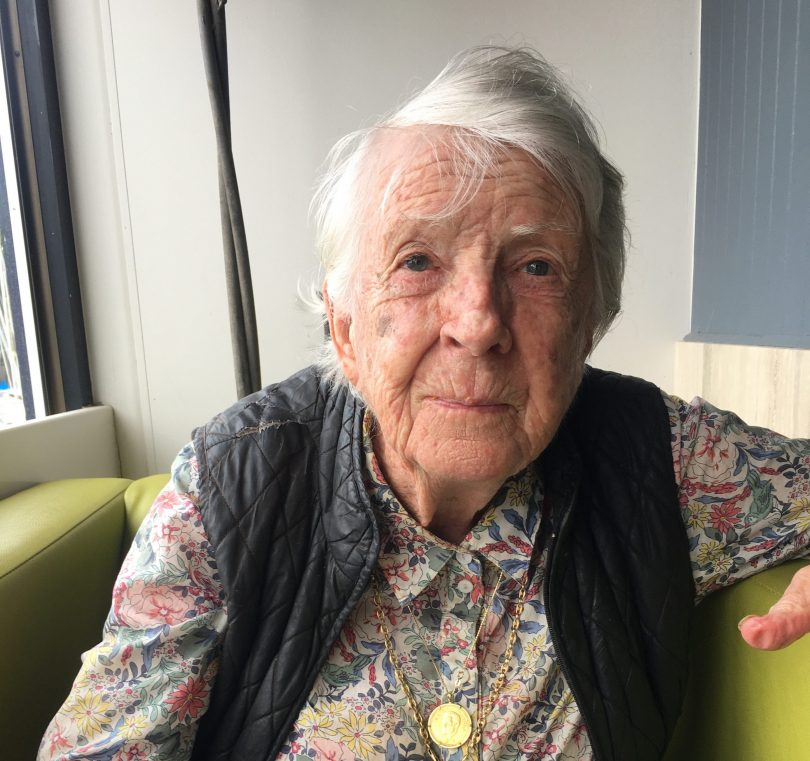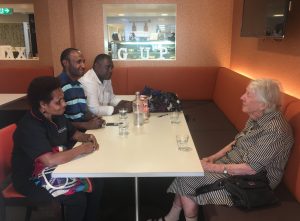Emeritus Professor Maev O’Collins, an important person in our collective history between Papua New Guinea (PNG) and Australia, has passed away in Canberra at the age of 92. As well as Maev’s joyous and warm spirit, it was her relationships with many Papua New Guineans and her stories about her life and friends in PNG that are markers of the real friendship between the two countries.
A salute to Maev is best done through reading her 2013 memoir, Last of the lands we know: recollections of the life and times of Maev O’Collins, as told to her nephew Les Coleman. Her memoir is a window into understanding her as a pioneering leader, whose story is intricately woven into the relationship between Australia and PNG during PNG’s independence period.
The following quotes from her memoir highlight the beginnings and the nature of her relationship with PNG.
In November 1970, an Australian embassy official who knew I was at International House [whilst completing a doctorate at Columbia University in New York] got in touch with me as he wanted to introduce me to Kipling Uiari, a Papua New Guinean who had graduated in psychology from the University of Queensland. Kipling was attached to the Australian Embassy as a representative of Papua New Guinea, which was then an Australian colony. He told me about a delegation coming to New York which included Michael Somare who – even as a young man – had become known in Australia as someone who showed promise. He commented enthusiastically: “We all think he is going to become our leader.” I took Kipling, Michael Somare and the Australian Diplomat to dinner at a steak-and-brew place that served prawns, oysters, and lobsters. At the time, apartheid in South Africa was an issue and everyone was helping to enforce trade bans. So I queried the staff about the seafood’s origins, and they assured us that the food was from Australia and not South Africa. But I always wondered whether this was really true. After we chatted over dinner, Somare said to me: “You are a long way from home. When you finish your studies, come and work for us at the new University in Port Moresby. Then if you get sick of us or we get sick of you, it’s not far to go home.” (p. 48)
Maev soon took the opportunity to apply for a job at the University of PNG (UPNG), and took up a lecturer position in the Department of Anthropology and Sociology in 1972.
My explicit role at UPNG was to immediately establish a social work programme that would reflect the needs of local people. Most personnel in the social welfare sector were expatriates, usually with generalist training and little relevant experience. (p. 64).
Reflecting her commitment to her work in PNG,
After a year or so at UPNG, I decided to go onto a local salary and not be paid the ‘overseas allowance’, which was equal to roughly twice the salary component. I could afford to do this because I was by myself with no dependents, and it proved I was there for sincere reasons. Another reason for my decision was that I was teaching subjects like community development and if I was paid as an expatriate I remained a distant foreigner who could never share the experience of being part of the local community. I thought I would feel more comfortable on a local salary. (p. 83)
In 1989 Maev was appointed Emeritus Professor of UPNG. In the same year, she left PNG and returned home to Australia and to Canberra. From 1990 she held an Honorary Visiting Fellow position with the Australian National University (ANU), and from 2000 she was an Adjunct Professor at the Australian Catholic University (ACU). In 2019, ACU awarded her an honorary doctorate for her extensive services to social work throughout her career.
In Canberra, Maev continued her work with PNG and the Pacific more broadly. She provided important advice to or hosted many of us students who passed through Canberra. She was always ready to lend an ear, while steadily guiding one to a positive outlook.
Maev loved PNG, and this is seen in the many close friendships she developed over her years there. Many of her students, among them my late mother, went on to hold leading positions in the PNG government. Though Maev helped many people, she always took care to acknowledge the mutual love and respect in her relationships:
I have always had the feeling that Papua New Guinea was my second home and that I have benefited so much from the experience of living there and making so many wonderful friends. (p. 222)
Many older Papua New Guineans and Australians who were involved in PNG’s independence period, especially those who passed through UPNG, will remember Maev. Some of my generation will know Maev personally through her close relationships with our parents and the support she provided us.
All Papua New Guineans and Australians should know more about Maev. Her approach to life and her character reflect a philosophy that has many lessons for all of us who love and live in the space that involves the relationship between Australia and PNG.
For those in Canberra, enquiries about Maev’s funeral arrangements can be directed to the Australian Catholic University by email: ocd.canberra@acu.edu.au
Disclosure
Michelle Nayahamui Rooney’s research is funded with the support of the ANU-UPNG Partnership, an initiative of the PNG-Australia Partnership. The views represent those of the author only.




Thank you for this article. Maev was my lecturer and head of school at UPNG where I studied Social Work 1976-1979 graduated. We kept in contact and 1995-1996 Maev asked me to take over her consultant work with PNG police force re improvements to welfare service for police and their families and increasing appointments of women into senior leadership roles across entire force. I completed this assignment in 1996-97. She was a real mentor and character and her legacy lives on. RIP Maev O’Collins
Jenny Cory. 7.8.2021
Hi Aunty Michelle!!!!! It’s me Hana-Dawn. I loved reading your article <3